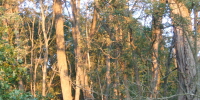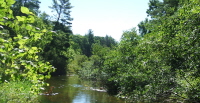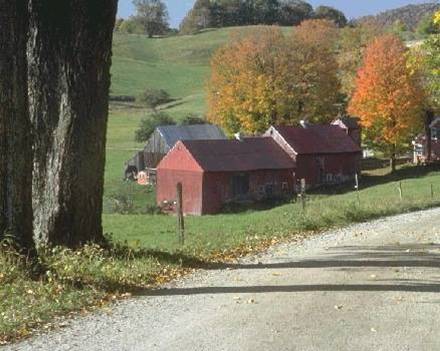ABOUT THE
INITIATIVE
HOME
MSU Land Policy Institute
Event Calendar
West Michigan Land Use Studies
GVSU Grant Projects
Land Use Bibliography
Funding Opportunities
Job/Internship Board
Land Use Links
Site map
FAQ
Contact us |
|
FUNDING OPPORTUNITIES
Welcome. We are hoping to create awareness of grant opportunities and highlight funding opportunities.
SPECIFIC GRANT OPPORTUNITIES
Sponsor: Charles Stewart Mott Foundation,
Deadline: Continuous. The foundation has no formal application form;
letters of inquiry, including a brief description of the project, are
acceptable for initial contact. Organizations seeking grants should begin the application process at
least four months before the start of the proposed grant period.
Foundation staff must finalize grant recommendations for any given
calendar year by August 31 of that year. Proposals received between
September 1 and December 31 will be considered in the following calendar
year.
Award: The majority of grants are between $15,000 and $250,000 annually.
Abstract: The foundation's grantmaking is organized into four program
areas: Civil Society; Environment; Flint, Michigan Area; and Pathways
out of Poverty. In all of its grantmaking, the foundation is particularly interested in
fresh approaches to solving community problems in the defined program
areas; approaches that, if proven successful, can generate long-term
support from other sources or be replicated in other communities when
appropriate; public policy development and research and development
activities to further existing programs, as well as to explore new
fields of interest; and approaches and activities that lead to systemic
change. To further these goals, the foundation provides both general-purpose
support and project-specific grants.
Sponsor: National Fish and Wildlife Foundation (NFWF)
Award: Request should not exceed $30,000 per year. Funding is available
for up to two years.
Abstract: The purpose of the Wildlife Links program is to fund research,
management, and education projects that will enhance wildlife management
on golf courses on a least a statewide, and preferably a region-wide or
national basis. Wildlife Links provides grants for cutting-edge
research, management, and education projects that improve golf courses
as habitat for wildlife, while also enhancing playing conditions for
golfers. Funding is not available for habitat improvements on individual
courses (butterfly gardens, nest box trails, etc.). Research projects
must be applied in nature and hold the promise of practical outcomes
that will benefit wildlife conservation through golf course design and
management. Applicants should clearly demonstrate communication with
appropriate representatives within the golf industry to ensure the
practicality of proposed projects. Native pollinators, aquatic
invertebrates, reptiles and amphibians, birds, and small mammals are all
priorities for Wildlife Links.
Research in Satellite Data Assimilation for Numerical Weather, Climate,
and Environmental Forecast Systems
Sponsor: United States Department of Commerce (DOC), National Oceanic
and Atmospheric Administration (NOAA), National Environmental Satellite,
Data, and Information Service (NESDIS)
Award: $50,000 - $450,000
Abstract: The National Environmental Satellite, Data, and Information
Service (NESDIS), Joint Center for Satellite Data Assimilation (JCSDA),
has announced the availability of Federal assistance for research in the
area of Satellite Data Assimilation for Numerical Weather, Climate, and
Environmental Forecast Systems. The goal of the JCSDA is to accelerate
the use of observations from earth-orbiting satellites in operational
numerical prediction models for the purpose of improving weather
forecasts, improving seasonal to inter-annual climate forecasts, and
increasing the physical accuracy of climate data sets. The advanced
instruments of current and planned NOAA, NASA, DOD, and international
agency satellite missions will provide large volumes of data on
atmospheric, oceanic, and land surface conditions with accuracies and
spatial resolutions never before achieved. The JCSDA will ensure that
the nation realizes the maximum benefit of its investment in space as
part of an advanced global observing system. Funded proposals will help
to accelerate the use of satellite data from both operational and
experimental spacecraft in operational and product driven weather and
climate prediction environments, develop community radiative transfer
models, develop improved surface emissivity models, and advance data
assimilation science.
Small Business Innovation Research (SBIR): Wildlife
Sponsor: United States Department of Agriculture (USDA)
Deadline: September 1, 2006
Award: $80,000
Abstract: The U.S. Department of Agriculture (USDA) is inviting
science-based small business firms to submit research proposals under
its Small Business Innovation Research Program for Fiscal Year 2007.
Objectives of the Small Business Innovation Research (SBIR) program
include stimulating technological innovation in the private sector,
strengthening the role of small businesses in meeting federal research
and development needs, increasing private sector commercialization of
innovations derived from USDA-supported research and development
efforts, and fostering and encouraging participation by women-owned and
socially and economically disadvantaged small business firms in
technological innovation. For Fiscal Year 2007, there are 13 research
topics. The objective of topic 8.10, "Wildlife", is to develop new or
improved technologies and environmentally sound approaches for improved
management of wildlife that will reduce the adverse impact of wildlife
on agriculture and people and enhance the sustainability of wildlife
populations. This program will focus on wildlife in terrestrial
(including birds), freshwater and estuarine environments, but not the
marine environment. This will include both the influence of wildlife on
agriculture and the influence of agriculture on wildlife.
Small Business Innovation Research (SBIR): Soil and Water Resources
Sponsor: United States Department of Agriculture (USDA)
Deadline: September 1, 2006
Award: $80,000
Abstract: The U.S. Department of Agriculture (USDA) is inviting
science-based small business firms to submit research proposals under
its Small Business Innovation Research Program for Fiscal Year 2007.
Objectives of the Small Business Innovation Research (SBIR) program
include stimulating technological innovation in the private sector,
strengthening the role of small businesses in meeting federal research
and development needs, increasing private sector commercialization of
innovations derived from USDA-supported research and development
efforts, and fostering and encouraging participation by women-owned and
socially and economically disadvantaged small business firms in
technological innovation. For Fiscal Year 2007, there are 13 research
topics. The objective of topic 8.4, "Soil and Water Resources," is to
develop technologies for conserving and protecting soil and water
resources while sustaining optimal farm and forest productivity and the
manufacture of resulting agricultural commodities.
Small Business Innovation Research (SBIR): Animal Manure Management
Sponsor: United States Department of Agriculture (USDA)
Deadline: September 1, 2006
Award: $80,000
Abstract: The U.S. Department of Agriculture (USDA) is inviting
science-based small business firms to submit research proposals under
its Small Business Innovation Research Program for Fiscal Year 2007.
Objectives of the Small Business Innovation Research (SBIR) program
include stimulating technological innovation in the private sector,
strengthening the role of small businesses in meeting federal research
and development needs, increasing private sector commercialization of
innovations derived from USDA-supported research and development
efforts, and fostering and encouraging participation by women-owned and
socially and economically disadvantaged small business firms in
technological innovation. For Fiscal Year 2007, there are 13 research
topics. The objective of topic 8.11, "Animal Manure Management," is to
develop new or improved technologies and environmentally sound
approaches for improved management of animal manures. This research area
may include other materials combined with the manure such as bedding,
litter, and water. The objective of the research is intended to reduce
the adverse impact of animal manure on the environment and people, and
improve the economics of animal production by optimizing manure
management technologies and creating value-added products derived from
animal manure.
Pollution Prevention Information Network Grants
Sponsor: United States Environmental Protection Agency (EPA), Office of
Pollution Prevention and Toxics (OPPT)
Deadline: July 31, 2006
Award: $120,000
Abstract: The Pollution Prevention Information Network grants seek to
coordinate work among technical assistance providers to minimize
duplication of effort and improve information collection, synthesis and
dissemination, and training for the promotion of pollution prevention
techniques. These funds will be targeted for regional applicants that
are willing to work as part of a collective nationwide service. Grantees
will make their information available electronically, publicly report
use of their services, and utilize state and local representatives to
guide and evaluate their services. Cooperative agreements will be
awarded under the authority of the Pollution Prevention Act of 1990.
Bernard L. Schwartz Fellows Program
Sponsor: New America Foundation
Deadline: Continuous. The New America Foundation will consider
fellowship applications throughout the year. Under no circumstances
should candidates contact a member of the New America Foundation's board
of directors in relation to a fellowship application.
Award: $75,000
Abstract: The purpose of New America Bernard L. Schwartz Fellows Program
is to train and support a new generation of aspiring public
intellectuals. Toward this end, the New America Foundation provides
economic, professional, and intellectual support to exceptionally
promising young writers, thinkers, and analysts who wish to establish
themselves as leading voices in the national policy debate. By investing
in the career development of many of the best and brightest civic-minded
writers of the day, the Foundation seeks to enrich the quality of
America's public debate for years to come.
Every year, The New America Foundation awards fellowships on a highly
competitive basis. At one end of the spectrum are Senior Fellows who
have already distinguished themselves as leading policy thinkers. At the
other end is a larger group of Fellows who have exceptional potential
but are not yet well-established. All Fellows come to the Foundation to
pursue solutions-oriented research and writing programs of their own
design. Fellowships are only available to U.S. citizens. Regular
fellows have typically shown great promise in writJanuary 3, 2008yet to establish themselves
as leading commentators in the public discourse. Senior fellows are
generally well-established journalists, academics, or policy analysts
who wish to make bold and risky departures in their work, or who,
because of the unconventionality of their thinking, lack obvious
patrons.
FY2007 Community-based Habitat Restoration Partnership Grants
Sponsor: National Oceanic and Atmospheric Administration
DeadJanuary 3, 2008trong> $100,000 - $2,000,000
Abstract: The NOAA Restoration Center (RC) invites the public to submit
applications requesting funding to establish multi-year national and
regional habitat restoration partnerships for up to three years.
Partnerships are expected to catalyze the implementation of
locally-driven, grass-roots habitat restoration projects that will
benefit living marine resources, including diadromous fish. NOAA
envisions working jointly on such partnerships through its
Community-based Restoration Program (CRP) to identify, evaluate, fund,
and administer projects with substantial community involvement that
restore NOAA trust resource habitats. This document describes the types
of habitat restoration partnerships that NOAA envisions establishing,
portrays the qualities that NOAA has found to be ideal in previously
established partnerships, and describes criteria under which
applications will be evaluated for funding consideration. Partnership
applications selected through this announcement will be implemented
through a grant or cooperative agreement, and will involve joint
selection of multiple community-based habitat restoration projects
funded as sub-awards made through the partner organization. Funding
requested to establish partnerships in FY2007 is expected to be greater
than funds available for this purpose and the selection process is
anticipated to be highly competitive. Funding of up to $10 million is
expected to be available to establish habitat restoration partnerships
in 2007, and annual funding is anticipated to maintain them for up to 3
years duration. Typical partnership awards will range from $200,000 to
$600,000 per year. This is not a request for individual community-based
habitat restoration project proposals.
Climate and Weather Impacts on Society and the Environment
Sponsor: National Oceanic and Atmospheric Administration
Deadline: Aug 28, 2006
Award: $400,000
Abstract: NOAA invites applications to establish a cooperative agreement
with the agency under the Climate and Weather Impacts on Society and the
Environment (CWISE) program. The agreement will be established between
the National Climatic Data Center, the Coastal Services Center, the
Climate Program Office and the award recipient to further understanding
and increase the resiliency of natural, economic and social systems to
weather and climate-related environmental stressors through
interdisciplinary research, information and services delivery,
education, and outreach. The program priorities for this opportunity
support NOAA's mission support goal of: Climate - Understand Climate
Variability and Change to Enhance Society's Ability to Plan and Respond.
Cumulative Impacts of Multiple Stressors (MultiStress)
Sponsor: National Oceanic and Atmospheric Administration
Deadline: Oct 23, 2006
Abstract: NOAA/NOS/NCCOS/CSCOR is soliciting proposals for projects of
up to 5 years in duration to investigate the impacts of multiple
stressors in coastal ocean ecosystems, including estuaries and the Great
Lakes. These projects should be interdisciplinary, multiple
investigator, and well-integrated studies designed to develop
capabilities for understanding, predicting, and managing the effects of
multiple stressors (both anthropogenic and natural) in coastal
ecosystems. The program priorities for this opportunity support NOAA's
mission support goal of: Ecosystems - Protect, Restore, and Manage Use
of Coastal and Ocean Resources through Ecosystem-Based Management.
Please contact our Grants Coordinator, Jody Simoes (simoes@landpolicy.msu.edu), and
watch for updates on the Land Policy Institute web site.
FOUNDATIONS THAT SUPPORT LAND USE
Charles Stewart Mott Foundation
The C.S. Mott Foundation focuses it philanthropy efforts in four main categories, one of which is “Environment”. Specifically, the Foundationidentifies Conservation of Freshwater Ecosystems Great Lakes region and portions of the southeastern United States as its program areas. “Support is provided for three important elements of that mix: Strengthening the Environmental Community, Public Policy Work, and Site-Based Conservation. More information about is foundation can be obtained at: http://www.mott.org/programs/env_conservation.asp
DTE Foundation
The DTE Foundation has two funding areas that relate directly to land use: development and environment. The DTE Foundation looks for development projects that “support the principle that locally directed physical and economic change is a uniquely powerful tool for neighborhood revitalization. By supporting nonprofit organizations that spur commercial development or collaborate to develop affordable housing, we help transform distressed neighborhoods into healthy communities.” DTE may support Environment-oriented projects or organizations “that seek to develop an awareness and understanding of the connections between environmental protection and sustainable development, as well as programs dedicated to the Great Lakes ecosystem.” Links to each of these can be found by clicking here: http://www.dteenergy.com/community/foundation/leadProgram.html
David & Lucile Packard Foundation
One of the five Packard Foundation areas if interest is “conservation and science.” More specifically, the foundation supports Marine Fisheries, Coastal Systems, Science for Oceans and Coasts, Atmosphere, Fellowships for Science and Engineering, Monterey Bay Aquarium Research Institute, and Conservation and Science–Other. More information about each of these areas is available at: http://www.packard.org/categoryList.aspx?RootCatID=3&CategoryID=61
The Frey Foundation
The Frey Foundation encourages “environmental preservation and seek[s] to maintain a balance between open land and well-planned development in our target communities of western Michigan. [Their] grantmaking priorities include: preserving and restoring high-quality lakes and streams, expanding recreation trails and greenways, protecting and preserving critical lands - including farmland, parkland and natural areas of rich biodiversity, and beautifying scenic transportation corridors, including gateways and the control of billboards."
|
|







